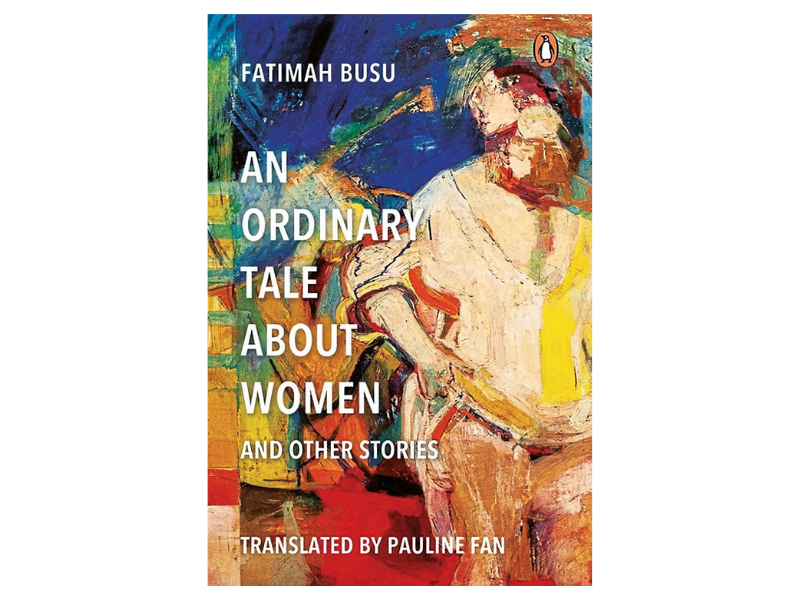
Fatimah's stories remain relevant today because of the tensions she explores continue to shape our world, says Fan (right) (Photo: Pauline Fan)
The women in Fatimah Busu’s books loved, lusted and gave life to children they could not keep. They struggled to feed the family, suffered the whims of authorities, were victims of moral policing and bent from the weight of social expectations. But in stoic and often unseen ways, they challenged traditional boundaries, defiant and unbowed.
The octogenarian author’s protagonists have been “resurrected” in a book of her short stories translated by Pauline Fan, who was captivated by how they are “so refreshingly radical” in terms of subject matter and literary style.
An Ordinary Tale about Women and Other Stories has 10 tales written between the 1960s and 1990s. These were chosen because they capture Fatimah’s range as a storyteller, from her early work portraying the realities of kampung life in Kelantan — her birthplace — to her bold experimentation with narrative form and raw depiction of taboo topics, and distinct mature approach.
Fatimah’s boldness was what urged Fan to translate her writing, which is rooted in the rhythms of oral storytelling and colloquialism, with repetitions, mythic elements and layered imagery. “I sought to retain these qualities as much as possible, allowing the text to breathe with its original cadence and richness. I strove to make her work come alive in the English language and carry across her distinctive voice.
“At times, this meant reducing repetitions so as not to sound redundant in English. I believe a good translation is never literal, and the greatest justice a translator can do to an original work is to make the translation highly readable without watering it down. I allowed my instinct to guide me in the process.
“Her boldness did not hold me back in any way. If anything, the challenge was to ensure her sharp critiques and emotional intensity remained just as potent in translation.
“I think the raw power of her work will still feel fresh, at times even shocking, to the contemporary audience. While it’s true certain conversations today [sound] more constrained, literature has always had the power to cut through prudishness and discomfort. Fatimah’s stories are fearless, and I wanted the translation to reflect that fearlessness.”
an_ordinary_tale_about_women.png

Fan hopes the publication of An Ordinary Tale About Women by Penguin Random House SEA will allow English-language readers to experience Fatimah’s powerful storytelling and that the renewed interest in her work will encourage people to seek out her books in the original Malay, despite the challenges of finding them as they have been out of print for decades.
She had to search in unexpected places to gather material for the compilation, which came about after she persuaded Fatimah to do a podcast interview for the 2020 George Town Literary Festival — of which Fan was director from 2019 to 2023.
Second-hand booksellers across the country were a big help, and the author herself was an important source: She photocopied some of her stories for Fan, who thinks readers with the time and patience can probably find some copies in the archives of Dewan Bahasa dan Pustaka.
“I truly feel her work should be made widely available again for Malay-language readers.” Whatever the medium, there is no missing the fierce, poetic and deeply perceptive content of Fatimah’s stories, which blend the psychological with the social, and explore the inner conflicts of her characters and the broader tensions within Malay society.
Fan lauds the formidable writer’s unrelenting honesty: She does not shy away from depicting suffering, injustice or the complexities of desire. At the same time, the myth, history and allegory embedded in her narratives make them grounded and expansive.
“Her prose is [packed] with Kelantanese dialect expressions and cultural depth, which meant I had to carefully navigate between staying true to her style and ensuring the translation felt natural in English. Some phrases had no direct equivalent, requiring thoughtful adaptation to retain their original weight and nuance.
“Her writing is rich with emotion, sometimes lush and evocative, other times sharp and stinging… To read her work is to enter a world that is intensely Malaysian, yet universal in its exploration of human frailty, resilience and longing.”
Ensuring all these are not lost in translation was fascinating, demanding and challenging, Fan admits.
When they first met, Fatimah lent her an out-of-print copy of stories. Kekasih Muharram caught her eye and she was smitten by its opening passages. “I had never encountered anything quite like it in Malay fiction,” recalls Fan, who immediately knew she wanted to translate the writer’s work. The Lovers of Muharram closes her collection, whose titular piece is about kampung girls lured by work in the factories in a city. Young and vulnerable, they fall prey to guys who use then dump them.
Author and translator met a couple of times during the project and spoke on the phone almost every week, sometimes to discuss certain terms or phrases unfamiliar to Fan.
She feels Fatimah’s stories remain strikingly relevant today because the tensions she explores and her portrayals of “everyday forms of resistance” continue to shape our world. "The struggles her female characters face against patriarchal systems and moralistic rhetoric are not relics of the past but enduring concerns that manifest in different ways across generations.”
Various stories she selected highlight the hypocrisy of legal institutions and social attitudes that criminalise women for a baby dumping and sex outside of marriage, often ignoring the broader systemic failures that contribute to these situations.
“Her fiction exposes how these laws disproportionately affect women, reinforcing cycles of shame and punishment rather than addressing the root causes of social issues.”
With female desire and reckless love obvious concerns in the collection, is it time to talk about sexuality?
“Yes, it is always time to talk about sexuality, not just as a matter of personal morality but also a question of justice. Who gets punished and who escapes scrutiny? Who decides what is ‘moral’ and what is ‘criminal’? Fatimah’s stories push us to confront these [issues], not just as literary themes but urgent realities that demand critical reflection and change.”
An Ordinary Tale About Women was launched recently at Areca Books in Penang, now home to Fatimah, who mentioned she had started writing a novel about her mother, titled Tanah Khadijah. But at 82, she feels she is unable to complete it as she can no longer work on a computer.
Fan hopes there may be some way to enable her to get the book done, perhaps through oral recording, though as a literary translator, she is aware the art of fiction writing is not necessarily easily conveyed through oral dictation. “Language works differently on the page and when spoken.”
In 2004, Fatimah, who also wrote essays on comparative literature and literary criticism, rejected the SEA Write Award in protest of the Tak Bai massacre, in which Thai security forces killed scores of Malay-Muslims in southern Thailand. Mainstream literary circles consider her somewhat controversial for her strong views and acute portrayals of the inner contradictions of Malay society.
This collection aims to bring her work to a wider audience and restore her rightful place in Malay literature, Fan states. In honouring her brilliance, it also “emphasises the importance of radical voices in the literary landscape and underscores the need to embrace subversive, unconventional writers who dare to challenge societal norms and push the boundaries of storytelling”.
How did Fatimah react to having her stories out in English and reaching a wider audience?
“She immediately welcomed my interest in her work, and was encouraging of my translations throughout the process. A few of her short stories have been translated into English, Vietnamese and Chinese and appeared in anthologies or academic journals, but this is the first stand-alone collection in English.”
“Fatimah told me she is proud to have her work made more accessible to readers worldwide. That makes me happy.”
Fan, who has a master’s degree in German Literature from the University of Oxford, has translated works by Immanuel Kant, Rainer Maria Rilke and Paul Celan from German to Malay. Her collection on Sarawakian Kulleh Grasi’s poems, Tell Me, Kenyalang (Circumference Books, 2019), was shortlisted in the US for the National Translation Award in Poetry and longlisted for the Best Translated Book Awards in 2020.
This story first appeared on Apr 14, 2025 in the Edge Malaysia.


